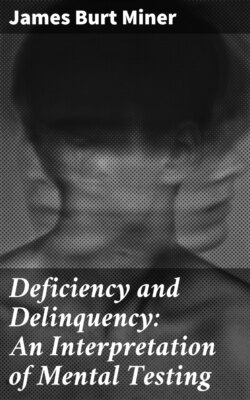Читать книгу Deficiency and Delinquency: An Interpretation of Mental Testing - James Burt Miner - Страница 9
На сайте Литреса книга снята с продажи.
C. Doubtful Intellects Accompanied by Delinquency Presumed Deficient.
ОглавлениеConative forms of feeble-mindedness are perhaps the most serious types in the field of delinquency. They are the troublesome portion of the borderland group of deficient delinquents about which there is so much concern. It is important to remember that it is just among these cases that the test judgment is least certain. In this dilemma one principle seems to be sound enough psychologically to be likely to meet with acceptance. I should state this principle as follows: A borderline case which has also shown serious and repeated delinquency should be classed as feeble-minded, the combination of doubtful intellect and repeated delinquency making him socially unfit. This will relieve the practical situation temporarily until tests are perfected which will detect those whose feebleness is specialized in those phases of volition centering around the instinctive passions, control, balance, interest and endurance. The principle recognizes that mental weakness is sometimes emphasized in the volitional processes of the mind.
The principle is apparently in conflict with the rule advocated by Dr. Wallin. Referring to the mental levels reached by individuals, he says: “We cannot consider X-, XI-, or XII-year-old criminals as feeble-minded because they happen to be criminals and refuse to consider X-, XI-, and XII-year-old housewives, farmers, laborers and merchants as feeble-minded simply because they are law abiding and successful” (214, p. 707). At another place he insists “that the rule must work both ways” (215, p. 74). Logically it would seem at first that it was a poor rule which did not work both ways. Further consideration will show, I believe, that there has been a confusion of feeble-mindedness with tested deficiency. If all the feeble-minded tested deficient intellectually then the tested level should determine whether or not they were feeble-minded. This, however, is not a correct psychological description of the facts. I prefer, therefore, to allow for those in a defined narrow range of weak intellects to be classed as deficient provided their weakness also manifests itself pronouncedly in the conative sphere.
The principle that all mental deficients need not show the same low degree of intellectual ability is clearly recognized in perhaps the most important legal enactment on deficiency which has been passed in recent years, the British Mental Deficiency Act of 1913. It states regarding “moral imbeciles” that they are persons “who from an early age display some permanent mental defect coupled with strong vicious or criminal propensities on which punishment has had little or no deterrent effect.” It specifically distinguishes them from the group of feeble-minded which require guardianship because of inability to care for themselves.
3. In Great Britain the term is restricted to those above the imbecile group.
